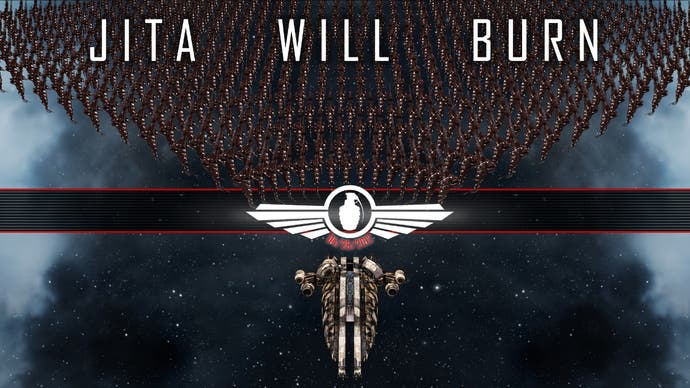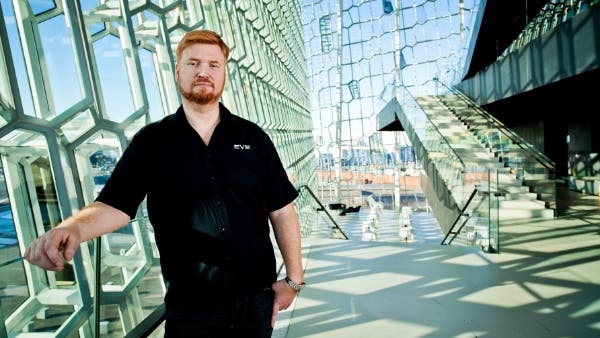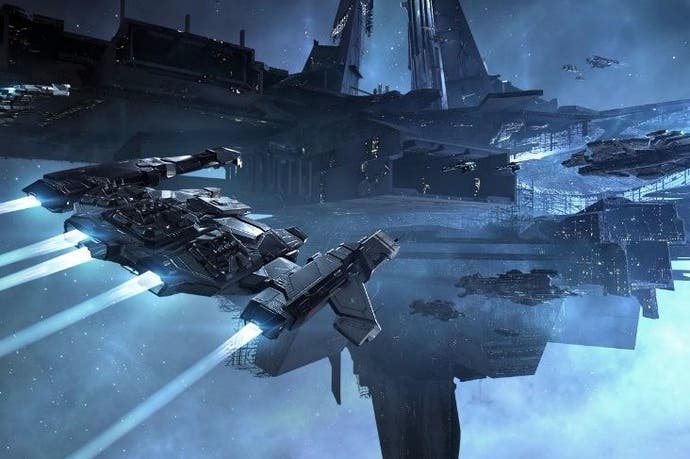How the Eve universe is changing
A different mood - and a different future for CCP - were on show at this year's Fanfest.
Something unexpectedly thrilling happened on Friday, during CCP's annual Eve Fanfest event in Reykjavik. Following last year's death of an in-game leader of the Amarr Empire faction (think very angry, very ruthless space monks with a fetish for lasers), players were tasked with representing the various fictional sub-factions hoping to fill the resultant power vacuum. The outcome of a series of matches between these representatives would determine the in-game heir to an empire.
I was a shy roleplayer even at the height of my obsession with Eve, but I am Amarr4Life and I can assure you that this final showdown between the remaining champions was a thrilling example of roleplay writ large across the Harpa centre's cavernous hall. Dry ice hissed and puffed its way ominously into the main chamber, the competitor's banks of PCs rose hydraulically into view, and Eve's endlessly tense soundtrack throbbed and hummed to tremendous effect in the background. The high-level combat that followed was as impenetrable as ever, but it was still a fabulous bit of theatre that laid an effortless bridge between two very different worlds.
Player agency is soon to change the game in even more significant ways than this, however. Eve Online might be more than a decade old, but it's set for one of its most significant shake-ups with the release of this week's Citadel expansion. The long-promised process of removing economic and industrial power from the hands of NPC factions, and instead placing them directly under the control of the players themselves, begins right now - and the prospects for conflict between all factions have never looked better.
Celestial cities, both freely deployable and destructible within the game's many regions, will soon provide player Corporations with a more meaningful home than they've enjoyed in the past. For one Corporation, their Citadel might represent a private fortress used for docking and fitting ships. For another, it could mean the opening of a new market hub that's freely available to all-comers, and is perhaps located conveniently closer to whatever the current conflict of the hour might happen to be.
More freedom for manufacturing and material-harvesting will come this winter, but for now the game's lead producer Andie Nordgren is content to enjoy seeing player groups of all shapes and sizes - not just the megalithic Alliances who populate New Eden's lawless areas - seize the opportunity to claim, conquer and defend a more meaningful presence in the game. "What I would like to see out of it is to see many, many more groups of more sizes establishing a foothold in space," she says. "A little bit of space that's theirs, and where they live. It's theirs in a more direct way."
Player-driven political change is already affecting the game in significant ways. With the infamously aggressive - and now overwhelmingly under-siege - Goonswarm collective largely sitting out this year's show, the mood has been feisty at Fanfest to say the least. Many a gleeful sideswipe at the Goons' current misfortunes could be heard at player panels this year, and it's hard not to shake the feeling that it's probably better to wait for a rabid dog to die before poking it with a stick. Nordgren herself is far from convinced that the current state of affairs represents the end of Goonswarm as we know it. She also sees conflicts such as these providing yet more fuel for the fires to burn with in a post-Citadel future:
"In my dream, if there's a war like there is now, you have industrialists and traders moving in and supplying the frontlines," she explains. These actions will, by themselves, scatter even more political traps across the thoroughfares of New Eden - misdemeanours waiting to be accounted for once the easy money's been made and everyone's gone home.

Beyond Eve Online, change is everywhere you look at Fanfest itself. Virtual Reality is no longer a fairground attraction designed to keep attendees occupied between panels, presentations and roundtable discussions with the developers. Proven success stories such as Eve Valkyrie and Gunjack now stand confidently alongside - yet independently of - Eve Online. They share a universe, and yet they exist in their own worlds.
This year's new prototype comes in the form of Project Nova, an experiment CCP hopes to fashion into a free-to-play shooter using the remnants of the ill-fated Dust 514. At this stage it's barely a vision of what it may or may not become in time, and it was not, in truth, much to my personal taste as an exceptionally slow and tactical shooter. Still the Eve flavour was apparent in the tense hacking of control points, and the familiar faction names scattered around the UI. Whether it thrives or fails as a finished game in the long-run (like all new projects it's under continual gated review) doesn't really matter unless you're CCP. What matters is the company's willingness to take such a primitive prototype to its players in the first place.
It's a world away from previous Fanfests. The CCP of old delighted in ending each Eve Online keynote with a bombastic trailer outlining the next extravagant vision of the future - one that couldn't hope to live up to reality, however much the developers and players alike might want to believe it might. They teased orbital laser strikes between independent - yet mutually influential - games, full avatar integration outside of Eve's spaceship game, and outlandish melding of disparate game systems. The new CCP would rather give something real - and realistic - to the players that they can touch now, rather than dream about, or fear intruding into their current game.
"There are all these crazy experiments going on which no one ever hears about," explains Torfi Frans Ólafsson, Creative Director Eve Universe IP, when I speak to him about this new approach. "Our policy now is that we don't talk to the fans about the weird stuff that never made it out of the gate. Expectation management is a lesson we've learned."
CCP is not the only major developer with a big-name MMO under its belt to stumble under the weight of player expectations. Even the success of World of Warcraft couldn't prevent the long drawn-out death of Blizzard's Project Titan, a game Jeff Kaplan recently described as an "utter failure". Ólafsson believes this is as much down to external pressures as anything else.
"I think Blizzard realised that the market moves faster than a team building an MMO, and it's exponential," he says. "Years ago you could spend four years on a game, knowing roughly what the hardware would be, what the monetisation [model] would be. We've had lessons where we've started working on something, and then four years later it's not right for the market." At this point in the conversation, I ask Ólafsson if I can infer World of Darkness from his comments. He acknowledges the observation as fair but does so reluctantly - these are clearly still raw wounds for the company.
There is something of CCP in every one of these new, experimental projects though, and I ask Ólafsson what he believes that bottled essence is. He identifies aspects of open-endedness, unknown consequences and emergent behaviour as a key driver of the CCP vision. "Sitting back and observing the consequences in partnership with the players - that's what keeps me going. That's the mystery and magic of it."

When I talk to Hilmar Pétursson, CCP's CEO, later on that weekend, I put the same question to him. "I remember one of the first lines of the Eve Online script was "Death is a serious matter," he tells me. "I think that's our fundamental thing: the element of consequences. I think another fundamental thing is to do with human trust and interaction. Innovation...doing something that hasn't been done before."
Having watched Pétursson introduce so many of these extraordinary trailers during Fanfests in years gone by, I find it hard to believe there isn't a little bit of him that doesn't still want to see these ambitious projects - having thrived independently - brought closer together in the spirit of the old CCP, and closer to that dream of one unified science fiction experience. Assuming the players and the developers want it to happen, of course.
"It is definitely in my head," he admits when I ask him about the possibility. "When I play either Eve Online or Valkyrie, I have those same ideas and I imagine this thing. What I've learned though is that that's good, but everything has to work every step of the way."
"I have come to value actual delivery of results over talking about dreams. I still dream, I still talk about them. Doing it on stage and getting people hyped up on a dream? I give less value to that than I used to. It's a lot more valuable to deliver results."
This article was based on a press trip to Reykjavik. CCP paid for travel and accommodation.










